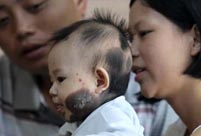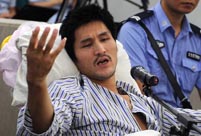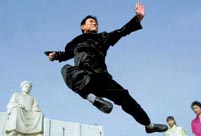New research shows that 28 percent of school-aged children with disabilities in China still cannot be enrolled at school.
A report by the China Disabled Persons' Federation on Tuesday said that by the end of last year 91,000 children with disabilities remained outside the State education system. These children with special needs face considerably more difficulties in accessing education than their able-bodied counterparts, who have a 99.85 percent enrollment rate.
However, the report said the situation has improved in the past five years, while the number of illiterate school-aged children has dropped on a yearly basis.
Zhang Jin, from the federation, said the country is injecting more funds into education and building more special education schools to guarantee the equal right to schooling.
A joint statement from the Ministry of Education and the federation said the annual central government subsidy for special education increased from 15 million yuan ($2.45 million) in 2008 to 50 million yuan this year, with a total investment of 120 million yuan.
Since 2008, the central and local governments have provided more than 5.4 billion yuan to build 1,182 special education schools in less developed central and western regions, where educational resources are scarce.
Discrimination and inadequate allocation of special education resources are the biggest obstacles for children with disabilities, said education expert Xu Jiacheng, a professor at Beijing Union University.
"Especially in less developed areas, parents and teachers still think there is no need to educate children with disabilities," he said.
The central government operates two main systems of education for those with disabilities: mainstream schools and special education schools.
Mainstream schools don't always have facilities and teachers trained in special-needs education, he said.
In the special education system, students are divided according to the type of disability, with those who are mentally challenged facing the greatest difficulty, Xu added.
Yu Aifu, principal of a special education school in Nantong, Jiangsu province, said it only accepts mentally challenged students every three years.
The school, the only one of its kind in the county, with 85,000 disabled students, has 12 who are mentally challenged.
Those with physical disabilities are in a better situation, but for them the pursuit of higher education is a headache.
Ni Zhen, 25, who lost his sight when he was 4, considers himself one of the lucky ones. He attended the only special education school for blind pupils in Tai'an, a city in Shandong province, and was admitted to Changchun University, majoring in massage, in 2004.
"Very few schools accept disabled students, and the majors available are also limited," he said. "Blind students can only study acupuncture and massage, while those who are deaf can only study design, painting, sign language interpretation and computers."
After graduating in 2008, Ni went to Britain to study public policy and is now a legal scholar in Hong Kong.
He said he could never have enjoyed such a life if he had remained on the Chinese mainland.
In his 80-page report, The Untapped Talent, he proposes that universities should open all majors to disabled students.
In March, the State Council revised the Regulation on Education for Persons with Disabilities, stating that "inclusive education" in regular schools for people with disabilities is specified as the primary choice.
Beijing, as the pilot city, has 80 percent of its regular schools open to inclusive education for disabled students, and these schools take more than three-fifths of the disabled students in the city.
Zhou Haibin, program officer with the International Labor Organization, said the inclusive education plan should also have special targets for different types of disability. For example, vocational training should be a focus for the mentally challenged after they attend junior high school.
"This needs more commitment from all aspects of society," he said. "It not only means an education system that recognizes and meets the learning needs of all students, but also an effort to achieve social inclusion for the disabled community."
 Pakistan suffers desperate shortage of water
Pakistan suffers desperate shortage of water New model of indigenous surface-to-air missiles testfired
New model of indigenous surface-to-air missiles testfired  Heritage train ride across western Kosovo
Heritage train ride across western Kosovo Baby girl 'too young' for birthmarks treatment
Baby girl 'too young' for birthmarks treatment Beijing court hears airport blast case
Beijing court hears airport blast case Harbin named Chinese city with most beautiful women
Harbin named Chinese city with most beautiful women Wushu spirit
Wushu spirit Rugby girls
Rugby girls Funniest photos of sport stars as kids
Funniest photos of sport stars as kids  Residences of the royal house of Savoy
Residences of the royal house of Savoy China's frigate 'Bengbu'in fire training
China's frigate 'Bengbu'in fire training The last days of Wan Aihua
The last days of Wan Aihua Highlights at 12th National Games of China
Highlights at 12th National Games of China Beijing Film Academy welcomes freshmen
Beijing Film Academy welcomes freshmen 2013 Taiwan Int'l Tourism Expo kicks off in Taipei
2013 Taiwan Int'l Tourism Expo kicks off in TaipeiDay|Week|Month